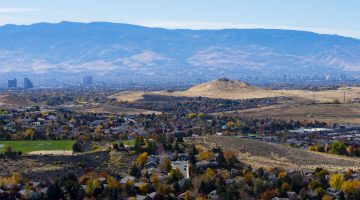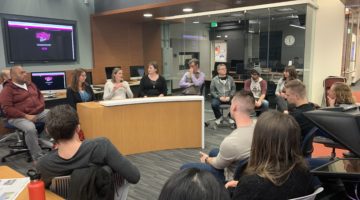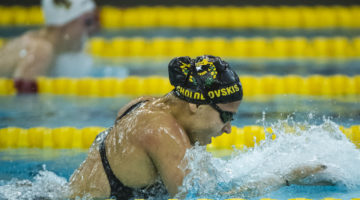 Breanna Denney/Sagebrush
Breanna Denney/Sagebrush
Pan Pantoja, founder of The Potentialist Workshop, stands in front of The Potentialist Workshop on Feb. 22. The Potentialist Workshop is currently hosting art from Rwandan artists.
By Blake Nelson
On East Second Street, just off Wells Street, sits the newest location of The Potentialist Workshop — an art venue that hosts much more than concerts and art space.
The space is home to a performance art space, artist studios and an art gallery, as well as participating in exchange programs with worldwide organizations. The Potentialist is specifically aimed toward the expansion of art in Reno and other parts of the world by continually allowing artists the opportunity to contribute to the community without financial stress.
The project, housed in an expansive space that covers over 10,000 square feet, was founded five years ago by Pan Pantoja. Originally, The Potentialist was located in the back of a thrift store on Keystone Avenue and has since expanded to the current space on East Second.
The new space has opened the project up to be much more inclusive for artists while still being able to reach a breadth of individuals who otherwise wouldn’t be able to benefit from the offered resources.
All the amenities that are offered by The Potentialist come with a price, something that many organizations in town have struggled with throughout the years.
However, Pantoja prides the project on being largely self-funded.
“The Potentialist will never be anything other than that, which is paying for it strictly off of the art,” Pantoja said.
Initially funded by a commissioned mural on the Keystone bridge, the space is now funded by its day-to-day activities. Ticket sales to concerts and theater events, as well as the funds from the 14 art studios for rent, make up the regular revenue. Event planning around town has also allowed for another means of income.
Compared to other art venues in Reno, The Potentialist is singular in the self-funded aspect.
And it seems to be working — the calendar for the space is mostly full every month, whether it be a theater production by Pantoja himself, or workshops whose topics change weekly. This doesn’t include events outside of the venue, like fundraisers or associated projects with Reno Art Works.
To keep costs down, the project only employs four directors for executive, marketing, space and music matters. Pantoja mentions that these are not the directors’ only duties at The Potentialist though; all the directors also have backgrounds in various disciplines in art. The directors also write plays and compose either performance or musical pieces that are hosted at the space.
Besides the staff, the project offers internships to art students who want to learn multidisciplinary approaches in the art field.
Community members are also allowed to audition for roles in developing plays and performance art pieces.
All this activity is to cultivate a community that can make and sustain culture. To Pantoja, The Potentialist isn’t just an art space, but rather a philosophy on the creation of art.
“We want to continue to spread the idea that you can fix your world,” Pantoja said “The thought and the veracity at which we create at will hopefully inspire other cities.”
Pantoja has always worked to engage “The Potentialist” philosophy beyond Reno and has recently succeeded in doing so.
The project was recently engaged with the Niyo Cultural Center, an organization that helps support Rwandan children through education and art, to exchange art with Rwandan artists to expand the recognition of art and further the Center’s cause.
The Center came into contact with The Potentialist Workshop to set up an art exchange program with them to tour with art from Rwandan artists.
A collection of art by six Rwandan artists is currently being exhibited at The Potentialist Workshop as a result of the exchange. Niyo founder Pacifique Niyosenga is on tour with the exhibition and is set to go to Europe as well as other parts of America.
The Potentialist is going to go on tour with some collected local work to Europe and Africa later this year. Pantoja hopes to be able to disseminate The Potentialist philosophy as well as bring recognition to the Reno community through this endeavor.
Although the structure of The Potentialist is not very conventional in approach, Pantoja likes to think that the recent expansion and worldwide engagement is a sign that it is viable.
“I like to be an example that people can point to when they are told things are impossible, and show them that it can be done,” Pantoja said.
Overall the project is a beacon to what Reno has to offer not only the residents of the city, but to other communities around the world. The combined efforts of Pantoja and the other directors, as well as community artists and volunteers, has allowed a culture of change by way of art to grow in Reno.
Blake Nelson can be reached at tbynum@sagebrush.unr.edu or on Twitter @b_e_nelson.












